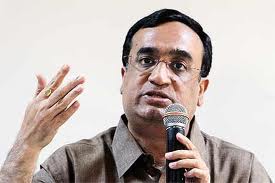New Delhi, Jul 15: A day after Narendra Modi listed what he described as the many failures of the government, the Congress issued a detailed rebuttal, challenging what it sardonically described as the BJP leader's "gyaan." 
At the top of its list was to challenge Mr Modi's accusation that the Congress falls upon the "burqa (veil) of secularism" when it is mired in a multitude of shortcomings.
"I believe the burqa of secularism is way better than the nakedness of communalism," said Ajay Maken, the head of the Congress's Communications Department.
The new war of words comes after a weekend during which Mr Modi faced severe criticism for his remark on the communal riots that lacerated his state in 2002. "If someone else is driving a car and we're sitting behind, even then if a puppy comes under the wheel, will it be painful or not? Of course it is," the Gujarat Chief Minister had said in an interview to news agency Reuters.
Mr Maken also devoted the rest of a lengthy press conference to challenge Mr Modi's own record on sectors like education and sports in his state.
In Pune yesterday, addressing his first public rally since he was made campaign chief of his party, the Gujarat Chief Minister pilloried the government's economic and other policies, including the new scheme that entitles nearly 800 million Indians to subsidised food, designed as a major vote-getter by the Congress.
"Out of 444 gold medals, how many did Gujarat win? Zero," said Mr Maken, referring to the National Games held in Jharkhand in 2011.
Earlier this morning, Union minister Shashi Tharoor used Twitter to target Mr Modi. "Modi says we "hide behind the burqa of secularism". Preferable, surely, to the khaki shorts of intolerance & hatred that he now tries to hide?" he posted.
Congress flays Modi
Hitting out at Narendra Modi over his veil of secularism remark, Congress today said the "cloak of secularism" envelopes all faiths while the veil of communalism is sectarian and the country is witnessing a clash of these two visions.
Congress leader and Information and Broadcasting Minister Manish Tewari said the choice before people was an inclusive India or an India which is sectarian.
"The cloak of secularism is all pervasive. It envelopes Hindus, Muslims, Sikhs, Jains - people of all faiths. While the veils of communalism are extremely sectarian. They believe, in their language people whom they qualify as 'kutte ka bachcha', which you (media) translated as puppies, should be crushed under the wheels of communalism," he told reporters here.
Modi had yesterday charged Congress with wearing the "burqa (veil) of secularism" and "hiding in a bunker" each time it is confronted with a crisis.
Tewari said, "This polarisation is not about Hindus versus Muslims, it is not about those who are the sufferers of a pogrom and those who inflicted the pogrom. It is about the basic idea of India, what kind of India we want to see".
"An India where people of all faiths, all religions, all dispensations, all inclinations have the right to progress in peace or an India which is sectarian in character, where some people believe that if you are not with us, you are against us and if you are against us, you deserve to be crushed under the wheels of communalism. I think that is the question we need to answer," he said.
The Congress leader said that the country had to choose between an inclusive vision and one that was sectarian and majoritarian.
"I think we are again back to basics, the fundamental clash of visions. The vision of the Congress party is pluralistic and inclusive. And the vision of the section of the opposition has been sectarian, majoritarian and communal right from the beginning," he said.





Comments
Add new comment